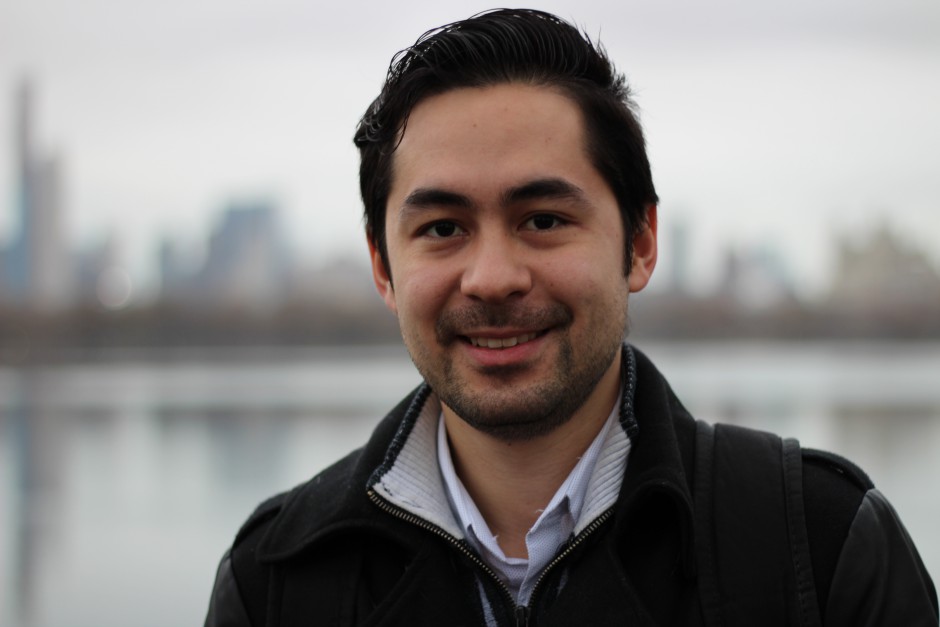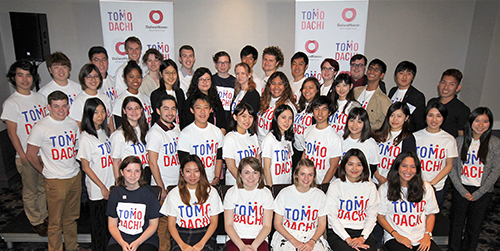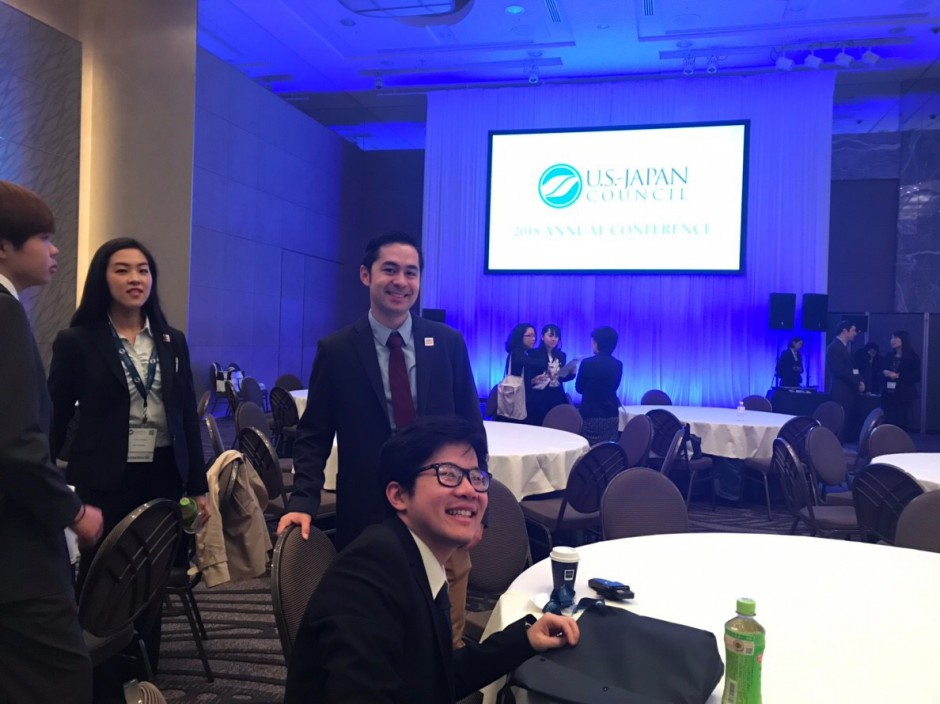Q&A with TOMODACHI Program Participants and TOMODACHI Alumni: Kekoa Erber

Kekoa Erber is an alumnus of the TOMODACHI Daiwa House Student Leadership Conference IV held in Chicago in 2017. He participated in the 2018 U.S.-Japan Council Annual Conference in Tokyo as a TOMODACHI alumnus and is an Associate member of the U.S.-Japan Council.
He is the current Government Relations Associate at the Association for Psychological Science (APS) in Washington, D.C. APS is an international organization dedicated to the advancement of scientific psychology. In this position, he advocates for science policy to the U.S. Congress and federal agencies. This position also allows him to cover international science news; he writes articles for the APS Observer including a piece on government funding for psychological science in Japan. He holds Bachelor of Arts degrees in both Political Science and Psychology with a minor in Global Asian Studies from DePaul University. While at DePaul, he completed two short-term study abroad trips in Okinawa and China. He is currently pursuing a Master of Arts in Security Policy Studies with a concentration in Transnational Security from George Washington University.
This interview was conducted virtually on September 30th, 2021, by 2021 TOMODACHI Alumni Intern Momoko Tajima, based out of Fukuoka, Japan.
1. What was the catalyst for your interest in Asia and U.S.-Japan relations?
My interest in Asia has come from my family heritage. I have extended family in Hawaii and distant family members in Okinawa and China. I already had an interest culturally in Asia, which led to an academic interest through history classes in high school and international relations classes in college. My interest then moved towards a political and security focus with Japan and China. I had a very positive view of Asia.
Growing up, I’d always been exposed to aspects of my Asian heritage. So it’s an area I wanted to further explore through travel, and broader cultural exchanges, because I think it’s a lot more impactful if you’re able to actually visit a country and experience what it’s like there, as opposed to just reading about it or experiencing it in the United States. That made me take part in short-term studying abroad in China and Okinawa.
During my study abroad, all the experiences were meaningful, which fit with my interests academically and personally. Academically, I was able to visit a lot of different universities and interact with students attending short lectures at each university. I also conducted research papers with them in China and had art projects in Okinawa.
I was able to broaden my perspective and deepen my understanding of cross-cultural communication through my experiences. It was a very involved program, covering a lot of ground in a short amount of time. On a personal note, I had an opportunity to meet and connect with my distant family in Okinawa and China. Overall, my interest in East Asia in the field of security and international relations has increased following the program. That made me join the 2017 TOMODACHI Daiwa House Student Leadership Conference to get more involved in U.S.-Japan relations.

Kekoa at the 2017 TOMODACHI Daiwa House Student Leadership Conference.
He is fourth from left in the second row.
2. What was the most significant takeaway from the program for you?
The program gave me the opportunity to meet a lot of great people, ranging from people my own age to industry leaders. Connecting with these individuals, specifically those in leadership positions in the industry, strengthened my networking skills.
There was one task where we were split into groups and had to work together to brainstorm solutions to problems within our groups. This collaborative effort taught me how to bring different ideas together and work effectively with others which strengthened my leadership skills.
Above all else, the most significant takeaway for me was the fact that the program helped me discover the way I could contribute to U.S.-Japan relations.I see myself being able to contribute jointly, both professionally and academically. Rather than just studying the U,S,- Japan relationship or reading about it, I can clearly see the role I can take in order to contribute, something that I can attribute to this program. Additionally, I’m able to utilize the skills that I’ve learned during my academic career to potentially help other people discover what their interests are and act as an intermediary to help connect people with individuals who have more experience in a particular field.
At my current job as the Government Relations Associate at the Association for Psychological Science (APS), I was able to integrate U.S.-Japan relations into a few different work projects. I was able to write a piece for our magazine about government funding for psychological science in Japan. The article covered grant mechanisms and the ways the Japanese Society for the Promotion of Science and the Ministry of Education, Culture, Sport, Science and Technology support scientific research. I also interviewed APS staff from Japan to hear about their experiences with government support and getting research funded in Japan. That work was one of the major ways I’ve been able to integrate U.S.-Japan relations into my job thus far.

Kekoa at the 2018 U.S.-Japan Council Annual Conference in Tokyo
3. Did your realization that you could contribute to U.S.-Japan relations academically lead you to pursue a master’s degree?
Absolutely. Following my experiences studying abroad in Asia and the TOMODACHI program, I wanted to develop a deeper understanding of security issues with a regional focus on East Asia, which is an area where I felt that I had a lot more to learn. Moreover, I want to contribute to research on Asian security and international affairs, so I thought pursuing a master’s degree would really help. After graduating from college, I gained some work experience, but I always planned on pursuing my master’s degree.
As a master’s student, my concentration is transnational security, an area that I hadn’t covered too much during my undergraduate career. It really helped me deepen my understanding of security. Moreover, I think it’s nice to connect with my classmates from diverse backgrounds who have the same interests within my program. They expose me to different perspectives.
4. What are your future ambitions and how do you view the future of U.S-Japan relations?
I want to continue learning more about the legislative process in the United States to develop my government relations and advocacy skills. I think those skills are important and applicable in that they can help apply scientific policy recommendations and government relations to other areas. I think they complement my studies nicely. I want to apply my security studies knowledge towards research and deepen my understanding regarding how to work with governments to create better policies.
My most immediate goal is to finish my master degree and then hope to apply my interests in security policy, government relations, Asia and U.S.-Japan relations to my career.
As for the future U.S.-Japan relations, I think continuing programs and cultural exchanges like TOMODACHI and the U.S.-Japan Council is great. Programs sponsored by the government or universities can bring people together and foster connections around areas of interest. For example, if you look at science and technology, there’s a lot of growth in those fields. Cultural exchanges programs, university programs, and collaboration between governments are a major way people can develop a deeper understanding of a particular culture and become more comfortable working with people from other countries. I want to continue to connect more TOMODACHI Alumni and U.S.- Japan Council members [with one another].
5. What does TOMODACHI mean to you?
To me, TOMODACHI means community. Opportunities become available when people develop groups of individuals who have a common interest amongst them.People can make connections or friendships and work on areas of common interest. And I think ultimately, that’s building a community of people. So far, TOMODACHI is a community I’m happy to be a part of and want to continue to advance. I think that’s what’s been powerful for me and why the community and TOMODACHI go together.
6. Looking back on your experience, what do you think is important for students and young professionals?
My motivation has been driven by a desire to broaden my interests and horizons. That desire enabled me to stay involved, looking for opportunities and learning as long as I have the time and energy. I think it is important to set goals that you want to reach and plan or adjust your strategy as needed. Additionally, I recommend that you find a healthy way to relax and make sure you’re not overcommitted since there are limits on time and energy.
I also think it is important to be open to making connections and engage in programs like TOMODACHI and take part in organizations like the U.S.-Japan Council. Once you make connections, you can continue building these communities and networks. You can build your networking skills through the TOMODACHI program by connecting with lots of people like I did.


